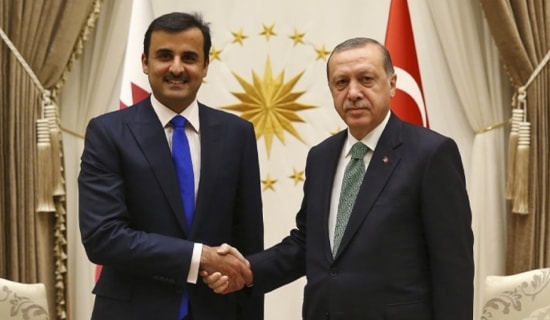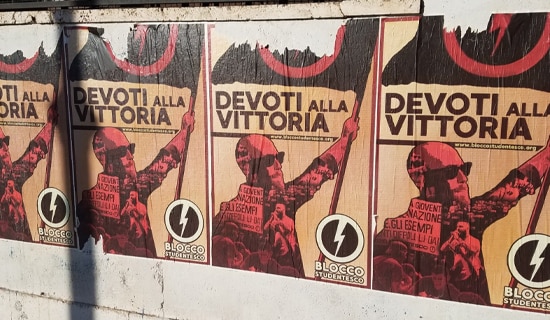On May 9, 2023, the Muslim Scholar Forum issued a statement signed by over 60 notable Islamist scholars and prominent figures, including 'Ali Al-Qaradaghi, the secretary-general of the Qatar-funded-and-operated International Union Of Muslim Scholars (IUMS), endorsing President Recep Tayyip Erdoğan and calling on Muslims in Turkey to reelect him in the elections to be held on May 14. The statement, which praised Erdoğan for, among other things, welcoming exiled Islamists, converting the Hagia Sophia into a Mosque, and advocating for Muslim issues, and called on all Muslims worldwide to "support their brothers and sisters in Turkey through financial, media, political, and other means."
Alongside Al-Qaradaghi, the statement was signed by Muslim leaders from across the Arab and Muslim world, including: Sadiq Al-Gharyani, the grand mufti of Libya and member of the Muslim Brotherhood; Yemeni sheikh Abd Al-Majid Al-Zindani, whom the U.S. Department of the Treasury labeled a Specially Designated Global Terrorist in 2004; and U.S.-based IUMS member Dr. Sa'd Al-Din Hassanayn.

The following is a translation of the statement.
"This is a statement from the scholars of the Ummah to the people regarding the Turkish election as statements must be issued at the appropriate time according to Quran 4:83: 'But if they had referred it back to the Messenger or to those of authority among them, then the ones who [can] draw correct conclusions from it would have known about it.'
"Since the elections in Turkey are among the issues of significant importance to Muslims whose outcome impact both Muslims inside and outside Turkey, the people of knowledge cannot remain quiet and should provide guidance.
"It is widely known to all observers that under President Recep Tayyip Erdoğan's leadership, Turkey has brought substantial benefits to Muslims and the Turkish people have benefited the most as his policies have provided freedom and security, lifted hijab restrictions, mosque numbers have increased as well as Quran memorizers.
"This is in addition to the political growth that Turkey has achieved to become a powerful player in regional and international affairs as well as the massive economic growth allowing it to join the G20 after being a struggling country. Turkey now manufactures locally made electric cars and has discovered more oil and gas fields, which will add more economic and political growth to it.
"The country has also witnessed great advancements in military power: It manufactures its own armored vehicles, drones, and aircraft carriers. It has also witnessed an advancement in healthcare, the number of hospitals has increased and the services have improved as people used to wait in lines to receive services. All of these achievements have positively impacted Muslims in Turkey and abroad. Turkish voters understand the transformation their country has undergone under President Erdoğan's leadership. Comparing Turkey 20 years ago with Turkey now, you will notice a huge difference, as Istanbul has become one of the most beautiful cities in the world, while in the past it suffered from water shortages, and sewage and waste problems."
"In the Islamic world, Turkey has become a safe refuge for people suffering from injustice and oppression in their homelands. It is a refuge for the Uyghurs and the Rohingya Muslims as well as for the Muslims of the West who are concerned for themselves and their children due to Islamophobia and that social services will take custody of their children. Many Muslims found safety, dignity, and justice in Turkey, among them a number of Muslim scholars. Pious, religious, and qualified people, many of whom have been living there for a long time and have become part of the Turkish society; therefore, they have found safety and dignity."
"Turkey's interventions in many countries, such as its involvement in Libya to prevent the attack on the capital Tripoli, have positively impacted Muslims. Its intervention in Syria secured the northern regions, it sided with Qatar in the 2017 crisis and it extended its support to Azerbaijan to liberate the region occupied by Armenia.
"Turkey has strongly rejected Western disrespect of the Prophet Muhammad, reconverted Hagia Sophia into a Mosque as it was during the era of great conquests. Turkey has expressed a firm position regarding the issue of Bait Al-Maqdis [Jerusalem] and its ongoing development. The other side, his opponent in the elections does not conceal his intention to reverse these policies partially or entirely. The massive support he receives from the enemies of Turkey and the enemies of the Islamic world is not a secret and the Western media has mentioned it repeatedly. Therefore, and in light of the above-mentioned reasons and of other reasons that it would take too much time to detail, the scholars issue this further statement to guide the nation to do the following:
"Muslims with voting rights in these elections should cast their votes in favor of President Recep Tayyip Erdoğan, the Justice and Development Party, and their outstanding reform project which we have mentioned. Muslims without voting rights should support their brothers in Turkey through financial, media, political, and other means, in addition to praying to Allah the Almighty."
Signatories
Dr. 'Ali Al-Qaradaghi, secretary-general of the International Union of Muslim Scholars
Sheikh Sadiq Al-Gharyani, grand mufti of Libya
Sheikh 'Abd al-Majid Al-Zindani, founder of Al-Iman University in Yemen
Sheikh 'Abd al-Wahhab Akanji, president of the Association of Muslim scholars in Turkey
Sheikh Muhammad Al-Hassan Al-Dadou, president of the Scholars Training Center in Mauritania
Dr. Nawaf Al-Takruri, president of the Scholars Association of Palestine
Dr. Muhammad Al-Saghir, president of the Global Authority for Supporting the Prophet of Islam
Dr. Al-Hasan Ibn 'Ali Al-Kattani, president of the Association of Scholars of the Arab Maghreb
Sheikh Sa'id Al-Lafi, president of the Association of Imams, Preachers, and Advocates of Iraq
Sheikh 'Abd Al-Malik, president of the Union of Scholars in Pakistan
Muhammad Al-'Abdah, president of the Association of Muslim Scholars
Dr. 'Abd Al-Hayy Yusuf, president of the Ansar Al-Nabi Academy
Dr. Jamal 'Abd Al-Sattar, secretary-general of the Association of Sunni Scholars
Prof. Dr. Nassim Yasin, president of the Association of Palestinian Scholars
Dr. Sa'id Ibn Nasir Al-Ghamdi, secretary-general of the Scholars Forum
Dr. 'Abdullah Al-Sadah, imam of the Mosque of Imam Muhammad ibn 'Abd Al-Wahhab, Qatar
Sheikh Wan Subki Wan Salih, president of the International Union of Muslim Scholars branch in Malaysia
Dr. Hamd Sayyid Al-Binju'ini, official of the International Union of Muslim Scholars in the Kurdistan Region of Iraq
Dr. Ja'far Al-Talhawi, member of the Azhar Scholars Front
Sheikh 'Abdullah Ahmad Amin, one of the prominent scholars of Mauritania
Sheikh Ahmad Sheikhna Amat, one of the prominent scholars of Mauritania
Sheikh Muhammad Al-Amin Al-Taleb Youssef, one of the prominent scholars of Mauritania
Sheikh Ahmed Al-Hasani Al-Shanqiti, deputy secretary-general of the Association of Moroccan Scholars
Mukhtar Ibn al-Arabi Mumin, member of the Board of Trustees of the Global Authority for Supporting the Prophet of Islam, Algeria
Dr. Camelia Helmy Toulon, chair of the Family Committee at the International Union of Muslim Scholars
Dr. Naziha Amarig, president of the Civilizational Dialogue and Cognitive Integration Laboratory
Dr. Fatima Azzam, member of the Board of Trustees of the International Union of Muslim Scholars
Dr. Muhammad Husseyn Saeed Al-Afghani, Professor of Sharia Politics, Afghanistan
Prof. Dr. Abdul Fattah Al-Awaysi, founder of the Global Knowledge Project for Jerusalem
Prof. Dr. Hussein Ghazi Al-Samarra'i, member of the Iraqi Fiqh Assembly
Sheikh Muhammad Harun Khatibi, member of the Scientific Assembly of Afghan Scholars
Dr. Omar al-Shibli, professor of Ḥadith and Surah at Zaytouna University, Tunisia
Dr. Mohammed Hammam Melhem, professor of Jurisprudence and its Fundamentals, Sabah al-Din Zaim University
Dr. Kamel Subhi Salah, professor of Graduate Studies, Jordan
Dr. Khaled Abdulrahman Al-Shenou, professor at the University of Bahrain
Sheikh Ahmed al-Amri, president of Beit Al-Da'wa Waqf (Lebanon)
Dr. Mishary Sad Al-Mutrafy, Islamic Researcher and Preacher, Kuwait
Sheikh Hussein 'Abd Al-Aal, of the General Secretariat of the Authority for Supporting the Prophet of Islam
Dr. Muhammad 'Abd Al-Hamid Al-Shaqaldi, International Union of Muslim Scholars
Dr. Sad Al-Din Hassanayn, member of the International Union of Muslim Scholars, America
Dr. Munir Jum'a Ahmad, of the World Union of Muslim Scholars
Dr. Anas Ayrouth, of the College of Sharia and Law, University of Idlib
Dr. Tarek Al-Tawari, professor of Islamic Sharia, Kuwait University
Dr. Salah al-Muhayni, imam and preacher at the Kuwaiti Ministry of Awqaf
Sheikh 'Abdullah Ibn Tahir Ba Omar, preacher in the Sultanate of Oman
Dr. 'Abdullah Al-Zindani, president of the Yemeni Renaissance Association
Mohammed Elhami, of the General Secretariat of the Global Authority for Supporting the Prophet of Islam
Dr. Muhammad Al-Mokhtar Muhammad Al-Mami
Dr. Muhammad Al-Amin Ibn Mazid
Sheikh Sami Al-Sadi, secretary of the Research Committee at the Libyan Fatwa House
Sheikh Hassan Salman, member of the Muslim Scholars League
Muhammad Ismail, of the Dar Al-Uloum, Zahdan, Iran
Sheikh Hassan Qatorji, member of the board of trustees for the Global Authority for Supporting the Prophet of Islam
Dr. Saleh Husain Al-Riqab, Palestine
Sheikh Mahmoud Muhammad Turkistani, of the Union of scholars of East Turkistan
Sheikh Mulla Anwar Al-Farqini, president of schools and scholars' union, Turkey
Sheikh Islam Al-Omari, member of IUMS
Sa'd Yasin, deputy president of Schools and Scholars' Union, Turkey
Dr. Ahmad Yousif, university professor, Malaysia
Dr. Mahmoud Saeed Al-Shajarawi, member of IUMS
Dr. Muhammad Khalil Al-Rahman Al-Madani, secretary-general of scholars and clerics in Bangladesh and president of the Fatwa council in Bangladesh
Dr. Abd Al-Salam Al-Basyouni, member of the IUMS
Dr. Hassan Yashu, Professor at Mohamed I University, Morocco
Sheikh Muhammad Salem Bin Deddou, former president of scholar forum, Mauritania
Dr. Muhammad Zarouq (the poet), member of scholars committee, Mauritania




